In THE NAME OF GOD, THE MOST MERCIFUL AND THE ESPECIALLY MERCIFUL
IIUM Arabic Transliteration
Keyboard Layout (ALA-LC)
IIUM Arabic Transliteration Keyboard is easy to install and use keyboard layout for Windows computers.
It is based on the ALA-LC romanization system.
About the Keyboard
This keyboard is primarily based on the ALA-LC romanization system. The ALA-LC Arabic romanization rules PDF can be found hereHowever, it also incorporates some characters which are unique to the International Islamic University Malaysia (IIUM) system of transliteration used in the Department of Islamic Revealed Knowledge and Human Sciences (IRKHS). The keyboard also contains designated keys for typing ﷺ (pbuh) and ﷻ (jalla jalalhu) honorific symbols.The keyboard does not use any external or 3rd party software. Instead, it binds certain keyboard combinations to the Unicode character. This keyboard layout was created using Microsoft's Keyboard Layout Creator 1.4
ALA-LC system
Below is the layout for the American Library Association - Library of Congress (ALA-LC) system of Arabic transliteration. This table was taken from the Wikipedia page of Romanization of Arabic which also lists other popular transliteration systems.
| Arabic | English |
|---|---|
| ء | ʼ |
| ا | ā |
| ب | b |
| ت | t |
| ث | th |
| ج | j |
| ح | ḥ |
| خ | kh |
| د | d |
| ذ | dh |
| ر | r |
| ز | z |
| س | s |
| ش | sh |
| ص | ṣ |
| ض | ḍ |
| Arabic | English |
|---|---|
| ط | ṭ |
| ظ | ẓ |
| ع | ʻ (Turned Comma) |
| غ | gh |
| ف | f |
| ق | q |
| ك | k |
| ل | l |
| م | m |
| ن | n |
| ه | h |
| و | w; ū |
| ي | y; ī |
| آ | ā, ʼā |
| ة | h; t |
| ال | al- |
| ى | á |
| Vowels and Diphthongs | English |
|---|---|
| ـَ | a |
| ـِ | i |
| ـُ | u |
| ـَا | ā |
| ـِي | ī |
| ـُو | ū |
| ـَي | ay |
| ـَو | aw |
| ـً | an |
| ـٍ | in |
| ـٌ | un |
The IIUM System
The IIUM system is exactly the same as the ALA-LC system except in a handful of cases.The IIUM system uses different characters for ء (hamza) and ع (ayn).It also does not use a separate character for the ى (alif maqsura).
| Arabic | English Uppercase | English Lowercase |
|---|---|---|
| ء | ʾ (Right Half Ring) | ′ (Prime) |
| ع | ꜥ (latin small letter egyptological ain) | Ꜥ (latin capital letter egyptological ain) |
The Story Behind the Keyboard
Hi, this is Abdurraafi the creator of this keyboard layout. The idea for this keyboard layout was born out of the frustration faced by researchers who wasted several hours of their time doing the tedious work of transliterating the names of Arabic books and authors into English.At present transliteration or romanization to be exact, is usually done in one of two ways. Number 1, the typist manually copies and pastes the accented characters from a table onto the document, this is an extremely tedious and time-consuming task. Number 2, the typist can use a software to transliterate typed Arabic text into English. Apart from the fact that such softwares may not be available and accessible to everyone, another issue with this method is that the software works only in a few programs such as MS Word, and often the file breaks when exported or opened on a different computer or program.There is a simpler way. The idea for this was given to me one fine day by my friend Mufti Jawwad Ali who mentioned how nice it would be if we could make the task of transliteration easier and more intuitive. "Why can't the accented characters be placed on the keyboard based on the format we follow at IIUM...", he sighed. I then realised that just a year prior, I had, in fact, worked on developing a custom Arabic keyboard layout for a design project I was working on (The Yassarnal Quran video series for the Imam Development Program). The same could be done to make the task of Arabic to English Transliteration easier.After a few hours of sipping on room temperature instant coffee, the IIUM Arabic Transliteration Keyboard Layout was born.
The Layout
The IIUM Arabic Transliteration Keyboard Layout types like any normal English QWERTY keyboard.The accented letters can be accessed in two easy ways.The lowercase accented letters such as ā ṣ ḍ ḥ ṭ ẓ ī ū etc can be accessed by pressing the AltGr key (Alt Graph). The AltGr is simply the ALT key on the right side of the keyboard. Most modern keyboards have the AltGr function, however incase your keyboard does not perform the AltGr function properly, then simply press ALT + CTRL keys together with the intended letter.The uppercase accented letters such as Ā Ṣ Ḍ Ḥ Ṭ Ẓ Ī Ū etc can be accessed by pressing the AltGr + Shift keys.The keyboard also has designated keys for al-, ﷺ, ﷻThe complete layout is shown below:
AltGr state

AltGr + Shift state

The Complete List of Key-Combinations
| Character | Key Combination |
|---|---|
| ā | AltGr + A |
| ū | AltGr + U |
| ī | AltGr + I |
| ṣ | AltGr + S |
| ḍ | AltGr + D |
| ṭ | AltGr + T |
| ḥ | AltGr + H |
| ẓ | AltGr + Z |
| á (ALA-LC: Lowercase Alif Maqsura) | AltGr + X |
| ʼā | AltGr + C |
| ﷺ | AltGr + B |
| ﷻ | AltGr + N |
| al- | AltGr + L |
| ʼ (ALA-LC: Hamza) | AltGr + Q |
| ʾ (IIUM: Uppercase Hamza) | AltGr + W |
| ꜥ (IIUM: Lowercase Ayn) | AltGr + E |
| Character | Key Combination |
|---|---|
| Ā | AltGr + Shift + A |
| Ū | AltGr + Shift + U |
| Ī | AltGr + Shift + I |
| Ṣ | AltGr + Shift + S |
| Ḍ | AltGr + Shift + D |
| Ṭ | AltGr + Shift + T |
| Ḥ | AltGr + Shift + H |
| Ẓ | AltGr + Shift + Z |
| Á (ALA-LC: Uppercase Alif Maqsura) | AltGr + Shift + X |
| ʼĀ | AltGr + Shift + C |
| Al- | AltGr + Shift +L |
| ʻ (ALA-LC: Ayn) | AltGr + Shift +Q |
| ′ (IIUM: Uppercase Hamza) | AltGr + Shift + W |
| Ꜥ (IIUM: Uppercase Ayn) | AltGr + Shift + E |
Download and Installation
Step 1
Download the setup file hosted on archive.org.Click Here to DownloadThe file is a compressed RAR archive, and should look something like this once downloaded:
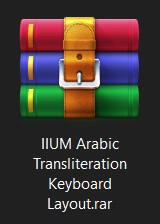
Step 2
Unzip/Unrar the package using a compression software such as WinRAR or 7Zip.If you don't have WinRAR or 7Zip.
Click the links below to download either one of them.
Download WinRAR
Download 7ZipRight-click on the compressed file and click Extract to IIUM Arabic Transliteration Keyboard Layout
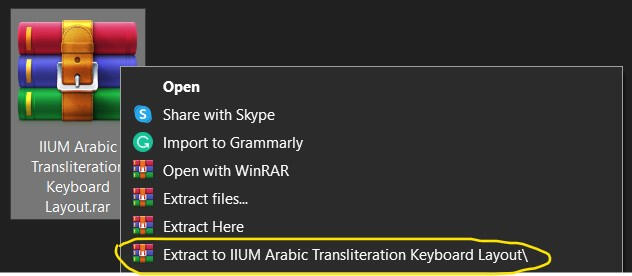
It should then extract the package content into a folder as shown below:
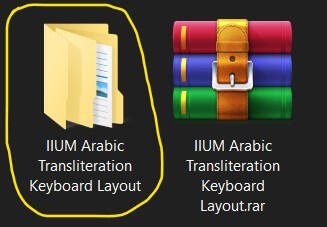
Open the folder
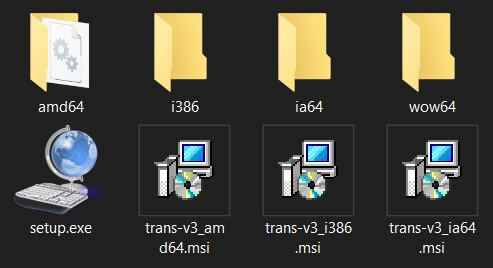
Double Click on setup.exe
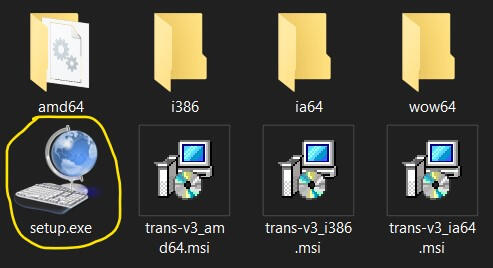
Setup should start and install the keyboard.
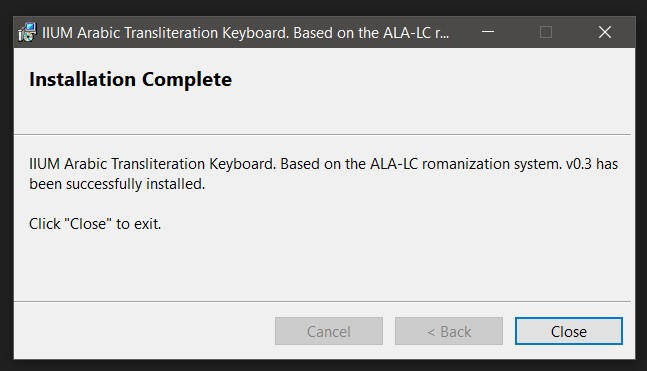
Click "Close" to exit. Restart the computer.
Step 3
Access the new keyboard layout by pressing Alt+Shift on the keyboard.
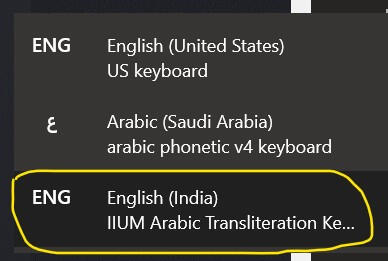
Known Issues:
1. Antivirus software might flag the setup file has potentially harmful. Rest assured the file downloaded from the link provided on this page is 100% safe and virus free. Simply whitelist the file if the issue persists. You can also disable your anti-virus software while installing and reenable it after installation is complete.2. Once installed, you may have to restart the computer in order for the keyboard to be accessible.Uninstallation
To uninstall simply double click the setup.exe file and follow the steps.
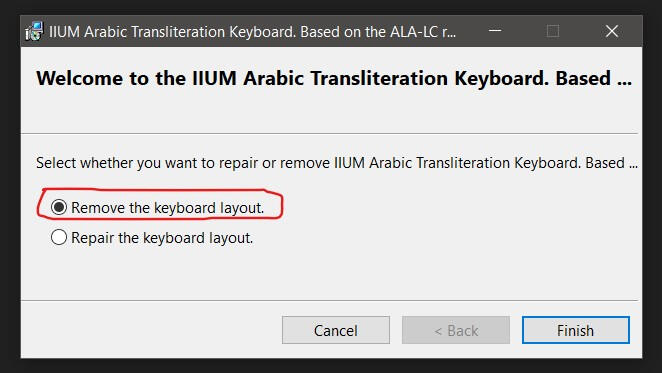
Have a Query or Suggestion?
Like the keyboard layout?
Show your support!
© Abdurraafi. All rights reserved
Photo Credits: Naim Fadil